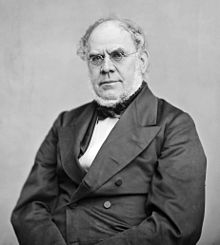Horatio Allen (original) (raw)
From Wikipedia, the free encyclopedia
American civil engineer and inventor
| Horatio Allen | |
|---|---|
 |
|
| Born | (1802-05-10)May 10, 1802Schenectady, New York |
| Died | December 31, 1889(1889-12-31) (aged 87)Montrose, New Jersey |
| Alma mater | Columbia University |
| Occupation | Civil engineer |
| Board member of | Erie Railroad American Society of Civil Engineers |
| Signature | |
 |
D&H high-pressure locomotive Horatio Allen, of 1924
Horatio Allen (May 10, 1802 – December 31, 1889) was an American civil engineer and inventor, and President of Erie Railroad in the year 1843–1844.[1]
Born in Schenectady, New York, he graduated from Columbia University in 1823, and was appointed Assistant Engineer of the Delaware and Hudson Canal Company (precursor to the railroad). In 1827 he quit the Canal Company and went to England to study the emerging rail road technology, particularly locomotives. He was therefore asked to arrange for the construction of 3 locomotives for the Canal Company's projected railway (as per his June 25, 1880 letter to the editor of the New York Times). There he made the acquaintance of engineer George Stephenson. In 1829 he operated the first steam locomotive, one of the ones he ordered for the D&H, to run in America, the Stourbridge Lion, which ran successfully at Honesdale, Pennsylvania on August 8, 1829.
From 1829 to 1834 he was the chief engineer of the South Carolina Canal and Rail Road Company, at that time the longest railway in the world (about 136 miles/218 km). He was the inventor of the so-called "swiveling truck" for railway cars. He wrote The Railroad Era: First Five Years of its Development (1884).
In his other activities, from 1838 to 1842 he was principal assistant engineer of the Croton Aqueduct, the major water supply system for New York City; in 1842 he became connected with the Novelty Iron Works, a major builder of marine steam and other engines; at various times chief engineer and president of the Erie Railway; consulting engineer for the Panama Railway and the Brooklyn Bridge; and in 1872 and 1873 was president of the American Society of Civil Engineers. He died on December 31 1889 in New Jersey
In 1924 the Delaware and Hudson Railway built its first experimental high-pressure locomotive, No. 1400 and named it "Horatio Allen".[2]
- Allen, Horatio (November 1953). "Diary of Horatio Allen 1828 (England)". Railway and Locomotive Historical Society Bulletin. 89 (89): 97–138. JSTOR 43520168.
- M. N. Forney, Memoir of Horatio Allen (reprinted from the Railroad and Engineering Journal)
- List of railroad executives
- ^
 "Allen, Horatio". The Biographical Dictionary of America. Vol. 1. 1906. p. 85.
"Allen, Horatio". The Biographical Dictionary of America. Vol. 1. 1906. p. 85. - ^ "The Horatio Allen Nº 1400". The Museum of Retro Technology. Retrieved July 30, 2017.
| Business positions | ||
|---|---|---|
| Preceded byWilliam Maxwell | President of Erie Railroad 1843–1844 | Succeeded byEleazer Lord |
